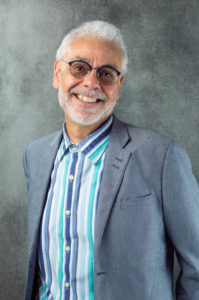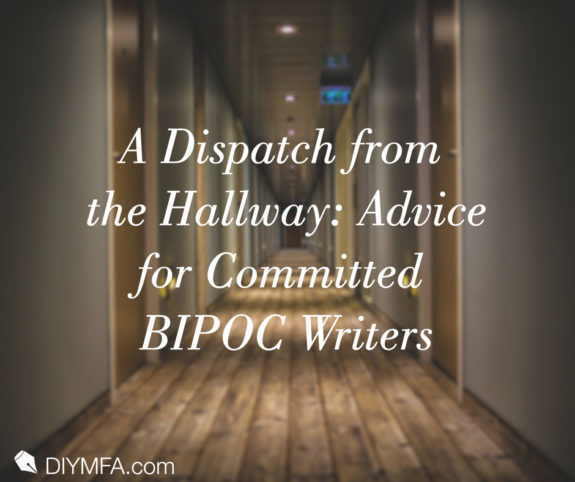I’m a Diasporican, a Puerto Rican living in a diaspora rooted in colonization and the trauma it brings. This reality has shaped my sense of identity and artistic purpose as a writer. Leaving my homeland at the age of five and living in the US for most of my life—with a chunk of time in Puerto Rico—has left me with profound feelings of unbelonging and displacement.
I often use the metaphor of a hallway to describe the liminal space which I inhabit psychologically, emotionally, and historically. It is an in-between space that offers a tenuous connection to two worlds separated by language and culture. I can enter the two rooms that this hallway connects, but in either one I still feel like I’m in the hallway. This sensation follows me everywhere and informs my writing, which is my attempt to understand it.
Not a Typical Immigrant Story
Some would say that this is the typical immigrant story. But it isn’t.
As Puerto Ricans, we are American citizens (since 1917) and our departure from the homeland is not fraught with struggles other immigrants faced. We boarded ships or planes and came here without passports. We could just as easily return home. That was not the case for millions of other immigrants who traveled thousands of miles to escape hardships, most vowing never to return.
Once in the States, Diasporicans find that we are second-class citizens and face racist and ethnic bigotry. If we return to the homeland, as I did for fifteen years, our brethren admonish us for not being real Puerto Ricans. You can see how this would make anyone feel left out in the hallway.
Writing about experiences straddling two cultures is nothing new in “American” literature, which is fundamentally multiethnic (and, one could add, multiracial). Much of the “American” ethos is about navigating between two cultures and the conflicts inherent in doing so.
MFAs, the Publishing Industry, and BIPOC Writers
That continues today as publishers have seen the demographic future of the country and seek to supply the increasing demand for multiethnic and multiracial material. As a BIPOC author, committed to writing stories about my community, I would like to share some thoughts about what it means to write from this subject position and strive to improve your craft while remaining true to your purpose.
I received my MFA from Columbia University in 1981, when there were roughly fifty such programs. Today, with more than 350 creative writing programs operating across the country, it seems that admission to one of them is a given for young, aspiring writers. Although the MFA has its benefits, especially if you want to teach, one can learn to write and publish professionally with the many resources available today. DIY MFA is a viable alternative, for sure.
No matter what route you take, BIPOC writers will find obstacles and challenges that their white counterparts will not.
In 2014, Junot Diaz wrote a piece in the New Yorker criticizing MFA programs for being “too white” (besides too male and heteronormative). He argued the student population usually contains a sprinkling of BIPOC; faculty is almost always all white; and there is no instruction dealing with race, racism, or the concept of whiteness and white bias. This blindness to race and whiteness often leads to what Diaz calls “blind spots” and assumptions concerning these crucial topics and how they impact publishing and writing.
His comments were valid then and seven years later still hold true. There is little progress in this area, because a white majority’s values and ideology dominate the academy, as every other major institution in America. This dominance filters to every aspect of the MFA program, including the workshop. As Diaz illustrated, many BIPOC students in these programs have experienced some racist or biased comment or sentiment expressed by either their peers or the instructor during workshop.
Discussions initiated by BIPOC writers about race and white privilege often meet stiff resistance and are identified as “political” and not “literary.” Essentially, the dynamic within these workshops, and the MFA programs in general, is the embedded, white-privileged conviction that white writers can write about anyone and anything with impunity. Meanwhile, committed BIPOC writers are only being didactic, dogmatic ideologues more interested in politics than creating “Literature.”
This attitude has not changed much today, except that white student writers and faculty in MFA programs are now versed in the “woke” nomenclature and deflecting strategies outlined so well in Robin DiAngelo’s White Fragility.
If you are a BIPOC writer, you might assume that you can avoid these problems if you skip the MFA. But you will find racism and vestiges of white supremacy in publishing whether it’s literary agencies, marketing, publicity, editors, or the commercial and small houses. Never assume that seemingly progressive institutions in the United States have liberated themselves from racism. Consider the minimal diversity in Hollywood and television, and how little recognition these “liberal” institutions give to BIPOC writers, directors, and actors (the same goes for women and LGBTQ communities).
What BIPOC Writers Can Do to Learn Their Craft and Publish
Support BIPOC authors committed to writing about their communities.
Buy their books and study their craft. Follow them on social media. Learn how they convey the authenticity of the culture or community they write about. Be attentive to how they handle themes and topics related to racism, sexism, and otherism in their work and in public.
Support literacy in your community. Buy books from community bookstores. Organizations like the Bronx Is Reading, help expand readership and book culture.
Sometimes, unfortunately, BIPOC writers unconsciously write characters and situations in their work that follow mainstream stereotypes and racialized tropes. I personally avoid these writers because their objectives do not align with mine.
Build a community of BIPOC writers and progressively-minded allies.
Join a writing group that is receptive and responsive to the material you are writing. You want supporters who give you honest feedback but admit when they do not know enough about it. Find culturally sensitive readers willing to ask questions without committing microaggressions.
Seek sites exclusively for BIPOC writers or which support them. Look for positive signs that go beyond the usual wokespeak you find on a site’s mission statement. Is the site’s staff diverse? Do they feature articles and material that reflect a genuine diverse agenda? Investigate various grants, retreats, and organizations (like VONA, which Diaz co-founded) that nourish, promote, and advocate for BIPOC writers.
Learn your community’s history.
A deep knowledge of history not only benefits you, but also provides a trove of ideas for your writing. Avoid the pitfalls of stereotyping your own characters and writing racialized cultural material and themes. These can easily slip into your work because we inhabit spaces that constantly bombard us with adverse representations of our communities. Conversely, develop and explore new ways to handle your material. The challenge is to stay true to the lived experience of your characters while placing them in fresh scenarios and situations that ring credible and authentic.
Find ways to expand the borders of the fictional world that the publishing industry has constructed for your community. Stay faithful to your vision and mission, as well as your aesthetic. Do not come across as didactic or preachy. You are an artist, not a propagandist.
Challenge the racialized and biased tropes associated with your community, especially the subtle ones that the mainstream finds acceptable and worthy of publication. When you are ready to publish a manuscript, research publishing houses with a track record of publishing BIPOC writers. If you cannot find a publisher, consider self-publishing.
In another article for this site, Ana Maria Spagna writes about being a committed writer who believes in the transformative power of literature. I agree with her, especially because as a BIPOC person and a Diasporican writer, it is imperative to tell the stories of people like me.
Every marginalized group in this country needs voices to give their group visibility, agency, and hope. The current political and social climate in this country calls for all artists to think critically about how they plan to utilize their talent. I cannot think of a higher calling for a writer than to serve that purpose

J.L. Torres is the author of The Family Terrorist and Other Stories, the novel The Accidental Native, and the poetry collection Boricua Passport. His latest collection, Migrations (2021, LARB Libros), received the inaugural Tomás Rivera Book Prize from the Los Angeles Review of Books. Born in Puerto Rico and raised in the South Bronx, he now lives in Plattsburgh, New York, where he has taught American literature, US ethnic literature, and creative writing at SUNY Plattsburgh. He holds a Ph.D. from the University of Southern California and an MFA in creative writing from Columbia University. You can reach J.L Torres at his website at https://jltorreswriter.com/, or on Twitter at @Rican_Writer.







